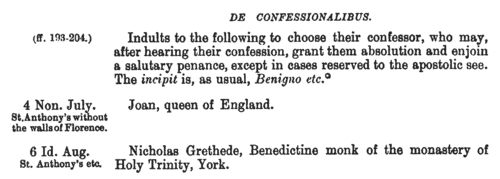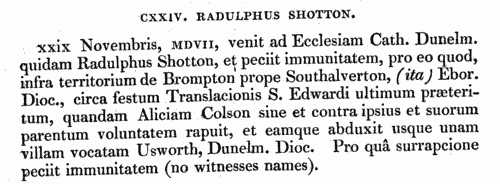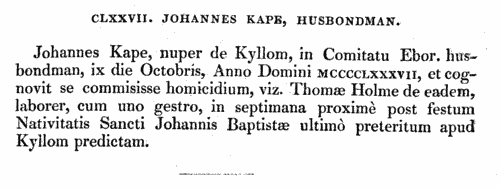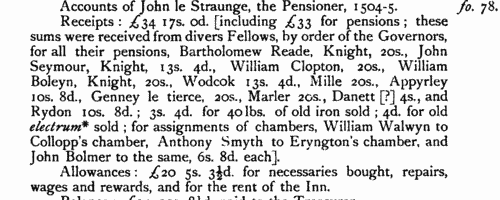Borow Surname Ancestry ResultsOur indexes 1000-1999 include entries for the spelling 'borow'. In the period you have requested, we have the following 11 records (displaying 1 to 10): Buy all | | | Get all 11 records to view, to save and print for £46.00 |
These sample scans are from the original record. You will get scans of the full pages or articles where the surname you searched for has been found. Your web browser may prevent the sample windows from opening; in this case please change your browser settings to allow pop-up windows from this site. Clergy, the religious and the faithful in Britain and Ireland
(1362-1404)
These are abstracts of the entries relating to Great Britain and Ireland from the Regesta of popes Urban V, Gregory XI, (Anti-Pope) Clement VII, Urban VI and Boniface IX, and the Lateran Regesta of Boniface IX. Many of these entries relate to clerical appointments and disputes, but there are also indults to devout laymen and women for portable altars, remission of sins, &c. This source is particularly valuable for Ireland, for which many of the key government records of this period are lost. Urban V was consecrated and crowned 6 November 1362 (the day from which his pontificate is dated); Gregory XI was crowned 5 January 1371; Clement VII 31 October 1378; Urban VI 18 April 1378; Boniface IX 9 November 1389 and died 1 October 1404. Until 1376 the papacy was in exile at Avignon. The extracts were made by W. H. Bliss from Regesta ccxlv to cccxx and Lateran Regesta i to xliii, and published in 1902. Bliss remarked that 'although the writing of the Papal Registers of the 14th century is clearer than that of many contemporary English MSS., the entries in them were for the most part founded upon petitions or letters from different countries, and the scribes in the Papal Chancery must have experienced even greater difficulty in copying English proper names than English students experience nowadays in reading the early Chancery Rolls preserved in the Public Record Office. Not having local or personal knowledge, they constantly misread doubtful letters.'BOROW. Cost: £4.00.  | Sample scan, click to enlarge

| Indults to Choose Confessors: Diocese of Lincoln
(1404-1415)
Individuals (laymen, monks or priests) could obtain indults or indulgences from the Pope to choose their confessor, who might, after hearing their confession, grant them absolution, and enjoin a salutary penance, except in cases reserved to the apostolic see. Lists of these indults, headed De Confessionibus, were entered in the Lateran Regesta in the Vatican archives; from the reigns of popes Innocent VII to John XXIII (1404 to 1415) there are such lists in volumes CXIX, CXXXI, CLIX to CLXI, CLXV, CLXVII and CLXXXIV, from the first year of Innocent VII, the second year of Gregory XII, and the second to fifth years of John XXIII. Those relating to the British Isles were copied and translated by J. A. Twemlow, and printed under the direction of the Master of the Rolls in 1904. The diocese of Lincoln covered Lincolnshire, Leicestershire and Rutland, Northamptonshire, Huntingdonshire, Oxfordshire, Buckinghamshire, Oxfordshire, Bedfordshire, and part of Hertfordshire.
BOROW. Cost: £4.00.  | Sample scan, click to enlarge

| Poor English Pilgrims in Rome
(1506)
Registers of English pilgrims staying in Rome, preserved among the archives of the English College, were extracted by W. C. Trevelyan and communicated to the Rev. John Hodgson, who published them in 1838. Two separate lists were maintained - of the rich and nobles, and of the poor. Both lists give date, full name, and diocese of origin in England and Wales.BOROW. Cost: £6.00.  | Sample scan, click to enlarge

| Murderers sheltering in Durham Cathedral: and their victims
(1464-1524)
Criminals could evade pursuit by claiming sanctuary in Durham Cathedral. Persons who took refuge fled to the north door of the cathedral, and knocked for admission. There were two chambers over the door in which men slept, for the purpose of admitting fugitives at any hour of the night. As soon as anyone was so admitted, the Galilee bell was immediately tolled, to give notice that someone had taken sanctuary. The offender was required to declare before witnesses the nature of his offence, and to toll a bell in token of his demanding the privilege of sanctuary. He was then provided with a gown of black cloth with a yellow cross, called St Cuthbert's Cross, upon the left shoulder. A grate was provided near the south door to sleep upon, and for 37 days sufficient provisions and bedding were provided. But within 40 days he had to appear before the coroner, clothed in sackcloth, and be branded on his right hand with the sign of the letter A. This signified that he was swearing to abjure the realm: he was then free to leave the country unhindered. The petitions for immunity were entered in the diocesan registers, usually with the marginal note 'Peticio Immunitatis': those from 18 June 1464 to 10 September 1524 (the privilege was finally abolished in 1624) were edited and printed by the Surtees Society in 1837 under the title Sanctuarium Dunelmense. Some of the criminals came from a considerable distance: the great majority were murderers or homicides. Each entry usually gives full name, original address, (often) trade, a brief description of the crime, often with date, and usually the name of the victim, as well as the witnesses to the petition. This index covers all the surnames given.BOROW. Cost: £4.00.  | Sample scan, click to enlarge

| Inhabitants of Suffolk
(1524)
The lay subsidy granted by Act of Parliament in 1523 was a tax on the laymen (as opposed to clergy), levied on householders, landowners, those possessing moveable goods worth £1 or more, and all workmen aged 16 or over earning £1 or more per annum. Real estate was taxed at a shilling in the pound; moveable goods worth £1 to £2 at fourpence a pound; £2 to £20 at sixpence a pound; and over £20 at a shilling in the pound. Wages were taxed at fourpence in the pound. Aliens were charged double; aliens not chargeable in the above categories had to pay a poll tax of eightpence. The records of the assessment for the county of Suffolk, mostly made in 1524, survive in 64 rolls in the National Archives. From 42 of these a compilation for the whole shire was printed in 1910 as Suffolk Green Book x. This includes a list of defaulters of 1526 and a subsidy roll of 1534 for Bury St Edmunds.BOROW. Cost: £4.00.  | Sample scan, click to enlarge

| Murderers sheltering in Beverley Minster: and their victims
(1478-1539)
Criminals could evade pursuit by claiming sanctuary in the church of St John in Beverley, in the East Riding of Yorkshire. This liberty of the minster extended a league in every direction from the church door, and was divided into six sections, each giving greater sanctity to the rights of sanctuary, the sixth and innermost section being the presbitery or chancel. Near the altar there was a stone chair called the Frith Stool, seated on which an accused could claim total immunity. The bailiff would receive the oath of the fugitive, and a clerk recorded 'what man he killed, and wher with, and both ther namez'; the bailiff receiving a fee of 2s 4d, the clerk 4d. Sanctuary was afforded for 30 days, with food and lodging, after which the fugitive was protected to the borders of the county. But within 40 days he had to appear before the coroner, clothed in sackcloth, and be branded on his right hand with the sign of the letter A. This signified that he was swearing to abjure the realm: he was then free to leave the country unhindered. At Beverley the clerks kept a separate register of fugitives' petitions, which survives from 1478 to 1539 in Harleian Manuscript 560. It was edited and printed by the Surtees Society in 1837 under the title Sanctuarium Beverlacense. Some of the criminals came from a considerable distance: the great majority were murderers or homicides. Each entry usually gives full name, original address, (often) trade, a brief description of the crime, often with date, and usually the name of the victim. This index covers all the surnames given.BOROW. Cost: £4.00.  | Sample scan, click to enlarge

| Freemen of London
(1540-1550)
The long series of mediaeval registers and books of admission of the freemen of London was destroyed by fire in 1786. Thirty surviving charred leaves were gathered together and rebound, becoming Egerton MS 2408 in the British Museum. The order is jumbled and generally speaking none can be dated with certainty, although all belong to the very end of the reign of Henry VIII and the start of the reign of his son, Edward VI. These are pages from the admission books. Each entry here usually gives the name of the person admitted to the freedom; his father's name, address and occupation; his entitlement to the freedom, usually by having served out an apprenticeship to a citizen, naming the master and his trade. Then there may follow a cross-reference to M. or N., being two volumes of another set of official books denoted by the letters of the alphabet, and following each other in chronological sequence, which evidently gave details of entries into apprenticeships. These other books no longer exist: but the dates given for entry do identify the start of the apprenticeship, and so give by implication a date for the eventual admission to freedom. In the margin is the name of the city ward and the total of the fee and fine paid on admission.BOROW. Cost: £4.00.  | Sample scan, click to enlarge

| London funerals and other news
(1550-1563)
Henry Machyn was a citizen and merchant-taylor of London. He had a professional interest in the lavish funerals of his fellow citizens, and in October 1550 started a note book giving brief details of these occasions. Soon he added political news, and (in an age before newspapers) he had a journalist's eye for accidents, hangings, the preachings and suppression of heretics, and the fortunes and misfortunes of dissidents. He lived in interesting times; the early death of Edward VI; the failed attempt to install Jane on the throne; the succession of queen Mary, and a lurch towards Catholicism; her marriage to Philip of Spain; her death, and the accession of queen Elizabeth. Machyn's humble journal, written for his own amusement and with a resolute indifference to orthography, became in its time an important historical source, used by Strype, and then edited by John Gough Nichols for the Camden Society and published in 1848.BOROW. Cost: £4.00.  | Sample scan, click to enlarge

| Lawyers and officers of Lincoln's Inn
(1422-1586)
Lincoln's Inn is one of the ancient inns of court in London exclusively invested with the right to call lawyers to the English bar. The Black Books of Lincoln's Inn are the main administrative records of the society, containing the names of those filling the different offices year by year; the annual accounts of the Pensioner and the Treasurer; regulations; punishments and fines for misdemeanours. This edition, printed for the Inn in 1897, covers the first five surviving volumes.BOROW. Cost: £6.00.  | Sample scan, click to enlarge

| Secretary of State's Papers
(1599)
The letters and papers of sir Robert Cecil, Secretary of State, deal with all manner of government business in England, Ireland and abroad.BOROW. Cost: £4.00.  | Sample scan, click to enlarge

|
| 1 | 2 |  |
Research your ancestry, family history, genealogy and one-name study by direct access to original records and archives indexed by surname.
|












